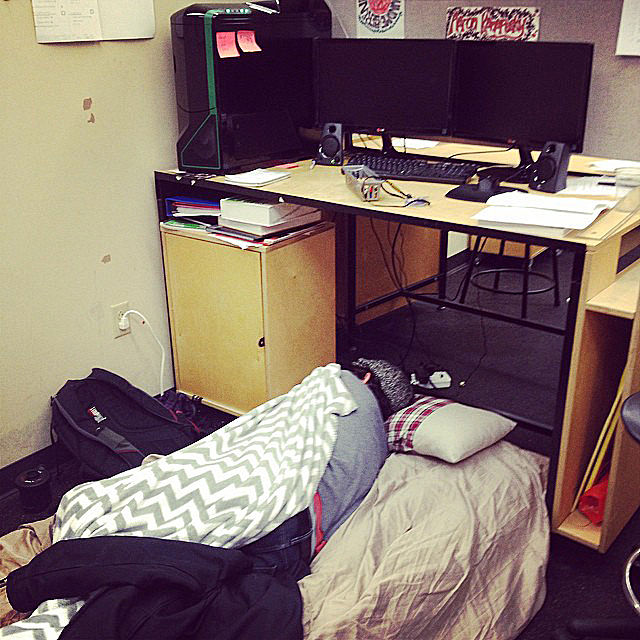Architecture students suffer from sleep deprivation, study says
Senior architecture major Aaron Kanapesky sleeps on an air mattress beneath his desk in the Tri-Towers Studio.
November 30, 2014
Many college students struggle to maintain a healthy sleep schedule, and at Kent State, architecture students complain about staying awake all night to get their work done.
Even at the late hours between 2 a.m. and 4 a.m., architecture students work in the studio in the M.A.C. Annex studio.
“I think even though we may have more work than a lot of other majors, it’s needed,” said Joseph Kula, a junior architect major. “We will need all of the stuff we do in the studio for our jobs in the future. We do things like design a rec center for a community.”
Kula said the projects assigned to them are very time consuming and all due at the same time. He said professors will send them on a scavenger hunts for things that aren’t on campus, so it takes more time.
Studies show that an irregular sleep schedule and lack of sleep can be unhealthy and can have negative consequences.
The Department of Neurology at the University of Michigan conducted a study on how sleep deprivation can affect college students.
“An adult who stayed awake for 17 hours is comparable to a blood alcohol concentration of 0.05 percent, and 24 hours would be over the legal limit at 1 percent,” according to the study.
Junior architecture major Matt Bowen said that every time he stays up late in the studio doing work he feels sleep deprived. He said that when he has to stay up multiple nights in a row, he gets sick and feels it’s unhealthy.
“Yeah, we definitely have more work than other majors,” Bowen said. “We have classes that we spend 20 plus hours a week on, yet the university calls it ‘three credit-hours.’ Less sleep means more stress. More stress makes everything about college suck. It’s harder to stay motivated, and it’s easy to lose track of your schedule and get behind on assignments.”
The study said there is evidence that shows a relationship between sleep and a student’s GPA. It said that students who get more sleep have a higher GPA than students who don’t.
One credit-hour equals three hours of work per week, according to the university, but many architecture students are saying they are working many more hours than that each week.
“In general, I do three hours of work per week per economics course,” junior economics major Seth Becker said. “I have plenty of sleepiness due to school work, but I have never pulled an all-nighter due to class work.”
In comparison of Becker to Bowen, Becker spends less time on his schoolwork than Bowen. Yet each student receives the same level degree.
“To stay up, things like energy drinks are a temporary fix,” Bowen said. “Everyone learns that pretty fast. The best way to stay up is to keep busy and don’t let your blood sugar get too low. Personally, I’ve become kind of used to staying up through the night, eating snacks, which are also unhealthy, and listening to music usually keeps me going. The real killer is trying to stay awake in a two-hour lecture at 7:45 a.m. after you didn’t get any sleep the night before.”
The study concluded that universities and colleges need to understand, acknowledge and publicize that policies and class schedules may have substantial effects on the sleep, learning and health of their students. The study also said investigations of new approaches to promote good sleeping habits could have significant influence on public health and should be prioritized.
Contact Chelsea Graff at [email protected].

















